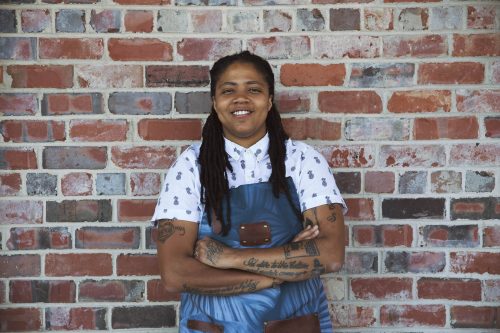Washington restaurant industry veteran Andra “AJ” Johnson on changing the city’s food culture, DMV Black Restaurant Week and her new book.

Photo by Maya Oren
Tell us about your book “White Plates, Black Faces” and other initiatives that have sprung from it—how the idea to write it came to be and what you plan for it to become.
I’ve been writing the book with hopes of telling the stories of Black hospitality professionals and how the D.C. restaurant industry has effectively shut Black people out of the rise of the burgeoning restaurant scene in this city. Restaurants, as with every other industry, lack transparency, diversity, equity and representation of people of color, most glaringly, Black people. From wanting to tell these stories, it has led to several projects such as DMV Black Restaurant Week (DMVbrw) and Back to Black.
Do you have any specific experiences as a Black woman that made you want to confront these issues on a broader scale?
My personal experiences are irrelevant. Every Black person who has ever lived has experienced racism. Every white person who has ever lived has had a part in perpetuating racism.
Just because someone is Black doesn’t mean that it is imperative that they speak on it. Racism is wrong. You don’t have to be a Black person to get that and you don’t have to be Black in order to speak out against it.
If you had to name the single biggest contributor to a lack of fair representation in the restaurant industry, what would you say?
Lack of generational wealth and systemic oppression that is built into the fabric of the American constitution and governing laws designed to keep Black people as second class citizens in a country that they built.
How have the killings of George Floyd, Breonna Taylor and countless others, followed by social justice demonstrations, impacted you personally and your goals for “White Plates, Black Faces?”
It hasn’t really affected my initial goals for WPBF. These events were horrific, but not anything that hasn’t happened to Black men and women for centuries. The only difference we’ve seen here is that non-Black people actually cared because they had time to care. It makes people more interested in the stories of Black people.
You also co-founded DMV Black Restaurant Week, which took place in November. How did that project come to fruition?
Dr. Erinn Tucker and Furard Tate saw an article about my “White Plates, Black Faces” project and we met and a few months later, Dr. Tucker asked Furard and I if we wanted to do a Black Restaurant Week in D.C. and we were all over it. From there we used our combined strengths and talents to put together programming that would benefit Black business owners.
Advice to up-and-coming Black food-entrepreneurs?
Don’t ever let them tell you that it was an accident or an oversight. Use your voice. Make the best products you possibly can make, always, because we have a smaller margin of error. Collaborate and ask for help.
5 Black-Owned Restaurant Favorites
Roaming RoosterCane
5 Black Dining Professionals to Watch
Kapri Robinson




